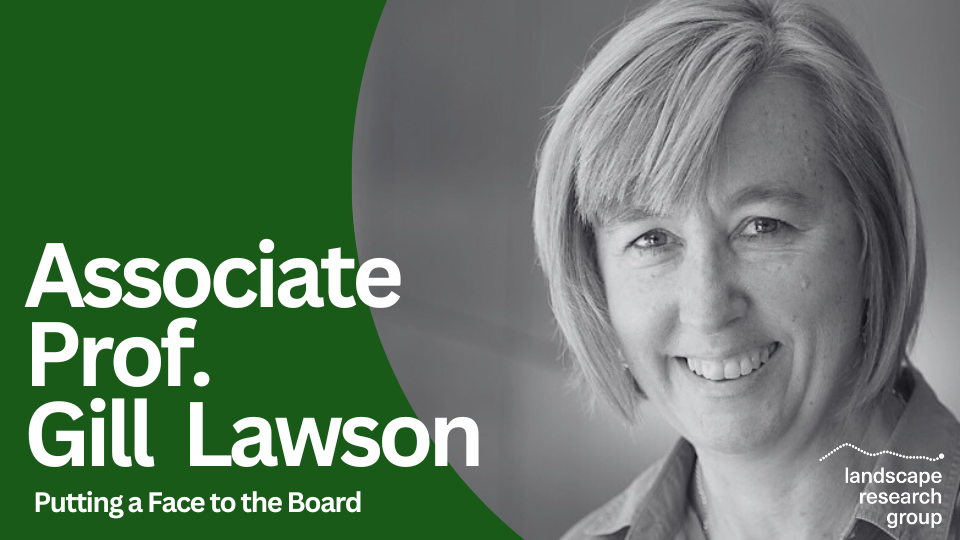

As part of our effort to help members get to know the people behind the Landscape Research Group, we are continuing our regular Trustee Spotlight feature to allow you to put faces and backgrounds to the names you might recognise from our communications and events.
In this article, we hear from Associate Professor Gill Lawson, based at Lincoln University’s School of Landscape Architecture in Aotearoa New Zealand. With research spanning landscape pedagogy, visualisation and the social dimensions of landscape across the Asia-Pacific region, Gill brings a deep understanding of the ways landscapes shape and are shaped by human experience. Her work explores how food, water and green infrastructure can drive adaptation to climate change.
Read on to discover what led Gill to join LRG, her work on building international networks, her passion for supporting early career researchers and what she sees on the horizon for landscape thinking and practice.
1. What first inspired you to get involved with the Landscape Research Group and what does being a trustee mean to you?
Tēnā koutou katoa! Greetings everyone!
I was lucky to have a wonderful rural upbringing in Geawegal Country in NSW, Australia, always outdoors exploring, watching and learning. Since then, I have searched for new challenges in exploring how we experience landscapes from many different perspectives, such as hang-gliding over Queenstown, New Zealand.
In 2021, Professor Jacky Bowring at Lincoln University, suggested that I stand for election for the LRG Board of Trustees. I had very little idea about what this would involve but thought I should give it a go. Becoming a LRG Trustee has opened up a range of opportunities for me to use my landscape expertise and expand my professional network of colleagues from around the world, from Australia and New Zealand, China, Vietnam and India, to Africa, Middle East, Europe, UK, even Iceland, learning what excites others’ interests and what they want to achieve.
For me, being a Trustee means supporting early career scholars to fly high and achieve their goals. I have spent most of my academic career doing just this and it is why LRG is so important to me.


2. What are you most proud of contributing to LRG during your time as a trustee?


Gosh! I guess I am proud of being part of such a great team of people who always appreciate every contribution you make. As with hot air ballooning over the Canterbury Plains in New Zealand, everyone pitches in to help with achieving a successful outcome!
I have assisted with recruiting three new staff for LRG, added my ‘supporting emerging researchers’ perspective to the Research Strategy, volunteered to become an Associate Editor for our Landscape Research journal and put up my hand for editing the well-known Routledge Companion to Landscape Studies 3rd edition for LRG’s 60th anniversary in 2027.
I have really enjoyed seeing the new manuscripts arriving for peer review with Landscape Research and doing my best to encourage authors to use reviewers’ comments to improve their work. I have become the lead editor in organising over 40 international author contributions with my co-editors for the Routledge Companion of Landscape Studies 3rd edition. That will be something that I will certainly be proud of when it is finished, that’s for sure!
I am also very pleased to bring Landscape Review, our Oceania Journal of Landscape Architecture, into a closer relationship with LRG as a co-funder of this publication with Lincoln University. We have built a strong literary reputation since 1995 with our registered users, professional institutes, landscape scholars and practitioners. This open access journal , free to both readers and authors, gives us a great opportunity to co-create issues around topics of interest with our network members in the Asia-Pacific region.
3. How do you see the role of LRG evolving in the coming years and what opportunities should landscape research focus on next?
Mmmm, I think that one of LRG’s great strengths is its intention to become a truly global and inclusive organisation. To contribute to this goal, I have started to work with my LRG colleagues on building two Asia-Pacific networks, one across China and the other across the Pacific archipelago from New Zealand to the Philippines, Hong Kong, Singapore, Indonesia, Malaysia and Thailand. LRG membership in the eastern hemisphere is as yet quite small compared to the UK, Europe and America. Both our Asia-Pacific networks are currently aiming to support the professional development of emerging researchers in publishing their work internationally, where financial resources are scarce. I believe that by helping each other and removing the tyranny of researcher isolation, the next generation of landscape scholars can succeed in an increasingly competitive academic world. LRG can provide a life jacket for when the weather turns nasty and you worry about being tossed overboard and drowning!


4. What excites you most about the future of landscape research – both within LRG and in the wider field?


I can see that landscape research will continue to address the wide range of challenges of climate change and building community and biodiversity resilience to climate impacts. It will also continue to reimagine public spaces for an increasing diversity of social and cultural needs based on past and present events.
But for me, it is the technological opportunities and challenges of blue sky research that excite me the most. The possibilities of effective collaboration with other technology-driven disciplines, such as archaeology, agriculture, computer science and environmental engineering, will be the hallmark of future landscape research. So, like learning how to fly a glider, you step into the cockpit and learn how to read the instruments and manage the controls of the aircraft! And off you go!


Our great strength will be what these technological opportunities can bring to bear on broader societal issues, such as reducing waste, water and energy consumption. I am sure that LRG will continue to strive for social justice for peace, prosperity and public health across the planet.
As someone who has a love of water in the landscape, from alpine to riverine, estuarine and marine places, I now advocate for those more-than-human creatures that live in these environments. Technology has a big part to play here too!
Kā mihi! Thank you!
Prof. Gill Lawson
LRG Trustee
Associate Professor
Lincoln University, School of Landscape Architecture, Lincoln, New Zealand
Enjoyed this Trustee Q&A?
LRG membership gives you the chance to shape the organisation behind it. As a member, you can vote in Board of Trustees elections and even stand for election yourself.
You will also gain access to our peer-reviewed journal Landscape Review and five other publications, be eligible to apply for the LRG Research Fund, take part in Critical Field Studies and share your work and ideas within a truly global community - along with several other valuable benefits
If you are not yet a member, now is the perfect time to join and get involved.
